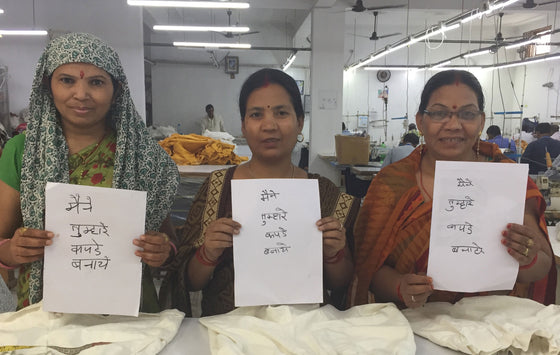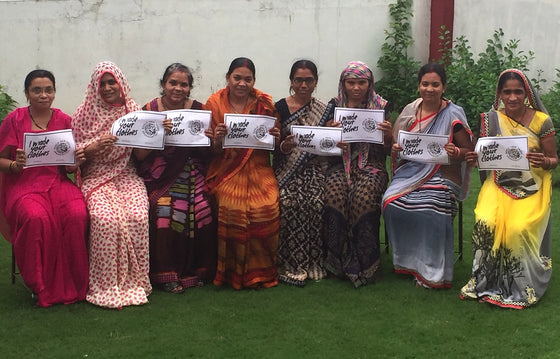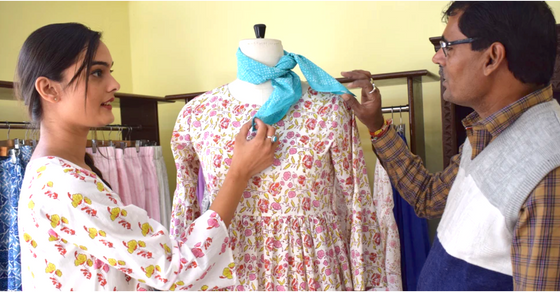RAKSHA BANDHAN - pledging love, devotion, protection
August 18, 2016

I was planning my first trip to India, back in 1978, when my middle sister, who was living in Germany, got wind of it, and asked if she could come along. She was an experienced traveler, and I was not; and since I have always been close to both of my sisters, I was more than happy to have her along.
In those days you couldn’t line up a ticket on-line. If you lived in Minnesota, as I did, you had to get the name of a reputable travel agent, who would most likely be in New York, spend a fortune on long distance calls, then send a bank draft for the fare, hope he wouldn’t rip you off, and then wait for your physical, actual, piece of paper, irreplaceable, ticket. Since my sister was in Germany, and the two of us planned to meet up in London before continuing on to India, this was going to be tricky. But she knew how to pull it off.
And she did.
The great day came. I boarded a flight from Minneapolis, put down several hours later at JFK, dragged my luggage out of the terminal and down a long walkway (long in my memory anyway) to the row of offices that housed all those “other” airlines—the ones from places other than the U.S. or Europe.
The office for Air India had a guard standing outside in an over-sized wool coat, and he was holding a rifle. Both the coat and the rifle looked to be vintage WWI. He stood aside and I pushed through the door into a throng of yelling people. Dazed, I wandered through the chaos for awhile, trying to find the end of the line to the ticket counter, but there didn’t seem to be a line anywhere, just a crowd and a lot of yelling.
Finally a company official came charging past me, and I managed to stick my ticket in his face, hoping to find out was what going on. He glanced briefly at the ticket and yelled, no doubt to be heard over all the other yelling, “Plane is delayed! Twelve hours!” And then he stormed off.
So I stood there stunned, like a kid from Minnesota who didn't know what was going on. I stood there for quite awhile, I think.
Then there was more shouting, and I realized an announcement was being made. It was that we were all to board a bus that would take us to a hotel for the night, where we would be provided with dinner, lodging, and breakfast, and then be brought back and put on a different flight in the morning, which would travel through London at break-knack speed, only stopping long enough to pick up connecting passengers.
This was done, and the hotel was comfortable, the food quite good, but of course I wasn’t able to sleep. No internet in those days, remember. My sister had, presumably, already traveled from Hanover, Germany, to London, and was now wondering what had happened to me.
The flight to London should have been pleasant, because the service and food were excellent. But I was eaten up with worry, and every so often I would stop a flight attendant and try to discuss my problem, only to be assured that everything would be taken care of upon arrival.
At last, shortly before landing, I laid out my situation more explicitly: my sister was waiting for me. We were supposed to board the plane I was on to continue on to Bombay, but now we were told not to get off the plane, as it was going to rush straight on. What had happened to her? I was ready to keep on, but then….
It happened.
“Your sister?” said the female flight attendant, instantly transformed, her face melting.
“Uh, yeah. My sister.”
“Don’t worry,” she smiled. “I’ll see to it.”
Then we got the signal to fasten our seat belts, we landed, we taxied to the gate.
Then I heard voices up ahead.
“Sister?” “His sister!”
Someone was calling up the boarding chute, “His sister! Where is his sister?”
Sympathetic looks were coming at me from all sides, and not just from the staff. Then a call came back from inside the terminal.
“She wants him to get off the plane!”
An airline officer took my carry-on bag, smiling with warm assurance, and told me, “Come. I will take you to your sister.”
We walked and walked. I don’t know how big Heathrow was in those days, but I’m sure it wasn’t really as big as it seemed from that walk, until finally we came to a closed door, which needed some kind of official pass to enter. But this was waived with the announcement, “He is here for his sister.” At which point I saw the face-melt happen again, across the room, multiplied, and I was escorted to a small office space at the rear where I, at last, found my sister.
She told me that everything had been taken care of. Arrangements had been made for us to spend that night in a hotel in London, and that seats had been arranged for us on a flight the next day. It should have been very tricky to arrange, normally, or even impossible, and she said,everyone had been shaking their heads at her until she mentioned that her traveling companion, now stranded in New York, was her brother.
At which point, she, too, witnessed the face-melt. “Your brother?”
At once, all wheels began to turn, all doors opened, charitable hearts were engaged, and a solution was found. After all, we were brother and sister!
We met this reaction repeatedly throughout our trip. We saw it again two nights later when we checked into a hotel in Pune.
“One room or two?”
“One.”
“Your wife?”
Was there a little sarcasm in the question?
“No, my sister.”
Face-melt.
“Your sister? You are traveling with your sister?”
Finally this reaction was explained to us by an elderly gentleman. In India, he said, the brother/sister relationship is held to be special and sacred. A love that is pure, a precious bond.
A relationship that is celebrated, in fact, by a special holiday called Raksha Bhandan.
Raksha Bhandan idealizes the brother/ssister relationship as the love and devotion of a sister being answered by the devotion of a brother accompanied by his pledge of lifelong protection.
Depending on family custom, the day is accordingly fun and happy, or solemn and purposeful. If the day is to be celebrated solemnly, the sister will spend some hours early in the day in prayer, before approaching her brother with a threaded bracelet, a rakhi. Binding the rakhi to his wrist, she pledges her love, and he answers with his vow of protection.
If the day is celebrated in a fun way, the prayers may or may not happen, and there will be some laughter and kidding. I recall being interrupted once, in a business meeting with a very serious man who was very serious about making a serious profit from me, when the door opened and his younger sister bounded in brandishing a rakhi. Instantly his face lit up, there were giggles and jokes as she tied the rakhi on his wrist, and then flew out the door again. He shook his head in wonderment, called for tea, and we relaxed for a few minutes, before getting back to the serious business of profit.
I have not yet mentioned an important component to this exchange, though it may not be adhered to by everyone. It is that on this day the sister can ask for a favor from her brother, and he must grant it. For example, the man whose serious business was interrupted that day by his sister had to promise to accompany her to a function in another town.
And then there is this: a girl, on this day, may also approach a young man, whom she would like to think of as a brother, and have him think of her as a sister. Binding the rakhi to his wrist, if he agrees, signifies that they are spiritually bound as siblings, and that he will always regard her safety and welfare as his responsibility.
This might be carried off in a light-hearted, playful manner, but the underlying purpose is considered to be a solemn one. The custom probably dates from an earlier time when a girl needed all the protection she could get.
There is a famous illustration of this in a story known by every Indian.
It is said that on the eve of a great battle, thousands of years ago, between Alexander the Great and Poros, the King of Punjab, Alexander’s newly wed wife, Roxanne, came to Poros with her rakhi. She was from that part of the world, so she knew the custom. She tied the rakhi to his wrist, and he asked her, “What do you want me to do?” She had made him her brother, and he owed her a favor, in addition to his pledge of protection.
“Do not kill Alexander,” she said. “I do not ask that you lose the battle, but if you meet Alexander face to face, I ask that you not kill him. He must not die by your hand.”
The next day in battle, Poros came near to killing a man when someone shouted out that the one he had subdued was Alexander. Hearing this, Poros released Alexander, and, in the end, the battle was won by the Greeks.
Poros was brought in chains before Alexander the following day. “What should I do with you?” Alexander asked. Poros answered, seemingly indifferent, “You’ve won. You can do whatever you like.”
It seems that Alexander was touched not only by Poros’ courage, but also by his honoring his pledge to Roxanne.
And, of course, Roxanne had made a spiritual brother of Poros, so if Alexander were to have put him to death, it would have been the death of a kin.
And also ignoble and ungenerous.
And probably would have made Roxanne mad as hell.
In the end, Alexander released Poros and restored his kingdom.
So that is what this day, Raksha Bhandan, is about, whether solemn or fun. Brotherhood, sisterhood, commitment, devotion, protection, and a love that is pure. In modern times, perhaps too, a time of making relationships stronger with a bond of affinity and love.
And, of course, the lead up to the day also provides its entertainment, when the girls go out to buy their rakhis, or get together and make them on their own.
At those times I suppose there is a lot of discussion and kidding about who the girls are planning to draft as brothers, but I wouldn't really know, as that isn’t a discussion I would ever be let in on.
--from the desk of Mark Keller
Leave a comment
Comments will be approved before showing up.








